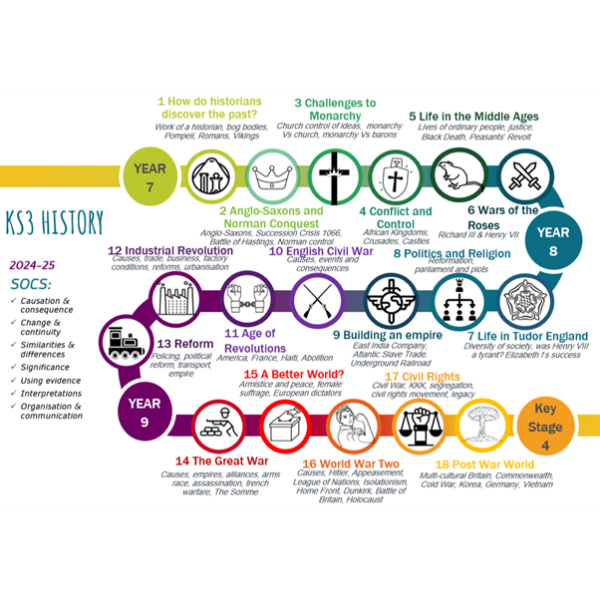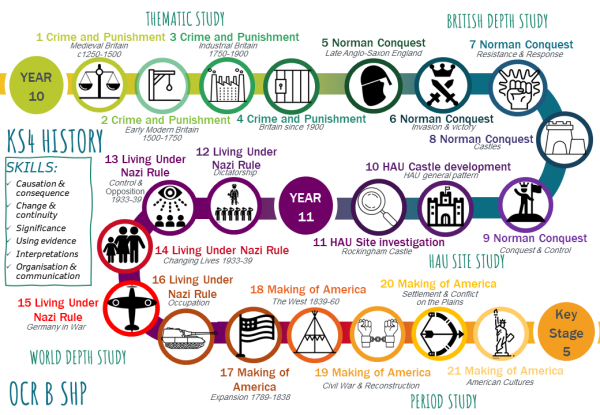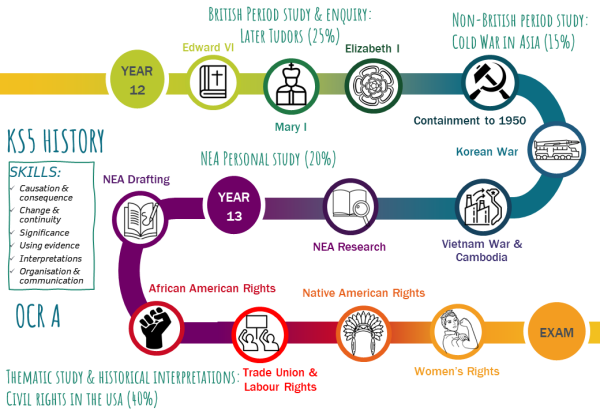History

The KC History curriculum helps to explain the world as it is by exploring the world as it was, in an intriguing and ambitious way. Historical enquiries are developed around a chronological spine of British history, which explore global, national and local scales, emphasising the complexity of the past. Students develop their disciplinary thinking, exploring the past from multiple perspectives, so that our students don’t just learn about the subject but also gain invaluable transferable skills. We strive to make our KC History curriculum diverse, exploratory and illuminative, so that our students feel represented in the studies that they undertake. These threads are combined and sequenced to craft a coherent, broad, and balanced understanding of the past for every student.
Our curriculum aims to produce “citizen historians” by helping change how our young people understand themselves, the world around them and their own place within it. Undoubtedly, increasing students’ historical knowledge, curiosity, critical thinking, and communication skills are all key functions of our curriculum. Increased knowledge of the past helps inform the identity of our young people; this curriculum will both give them confidence to build strong arguments of their own and the flexibility to incorporate new perspectives into their thinking. The KC History curriculum will help students question and influence the people and communities around them and therefore become active citizens in our school and local community, developing an awareness of their rights and responsibilities in an ever-changing world and hopefully a lifelong interest in the subject.
Our History curriculum exists, within the wider KC curriculum, to develop students and give them new power, through fostering of their intellectual curiosity, awareness of the diversity of experience and ability to form enlightened views, to enable them to take part in the great conversations of our time.
A people without the knowledge of their past history, origin and culture is like a tree without roots. - Marcus Garvey
Subject Overview:
The Y7 History curriculum is designed to build on students’ historical learning at KS2 and to develop their subject specific historical skills. We begin with a focus on the work of some key historians on the ancient history of pre-1066 that they have covered in their primary years. We then take them chronologically through the medieval period with a series of enquiry questions which focus on the key skills of History and introduce them to the key historical concepts of parliament, monarchy, diversity, revolution, empire and justice. We aim to build their confidence in thinking and writing like a historian.
Topics / Modules to be covered:
Y7 Overview – Iron Age to 1500
Term 1
- Enquiry 1 How do historians discover the past? (using evidence): work of a historian; Pompeii; Romans; Vikings
Term 2
- Enquiry 2 What was Anglo-Saxon England like? (similarity and difference): Anglo-Saxon society and government; Anglo-Saxon Kings Alfred the Great and Athelstan; Anglo-Saxon women’s stories
- Enquiry 3 How far did the Norman Conquest change England? (causation and consequence; change and continuity): Succession crisis 1066; Battle of Hastings; reasons for William the Conqueror’s victory at Hastings
Term 3
- Enquiry 3 How far did the Norman Conquest change England? (causation and consequence; change and continuity): Norman control through castles, Domesday Book and Feudal System
- Enquiry 4 How significantly was the power of medieval monarchy challenged? (significance): England in Anarchy; church control of ideas; monarchy vs church; monarchy vs barons
Term 4
- Enquiry 5 Why did African kingdoms become powerful in the medieval period? (causation): African kingdoms of Ghana, Great Zimbabwe, Mali Empire, Benin Empire and the Benin Bronzes
- Enquiry 6 What was the impact of the Crusades? (change and continuity): Crusades, Islamic learning
Term 5
- Enquiry 6 What was the impact of the Crusades? (change and continuity): castle development, Conquest of Wales
- Enquiry 7 Which sources reveal the most about medieval peasant life? (use of evidence): medieval village and town life; medieval justice
Term 6
- Enquiry 8 How far was the Black Death a disaster for England? (change and continuity): Silk Roads; cause and treatment of the Black Death; impact of the Black Death; the Peasants’ Revolt
- Enquiry 9 What do the Wars of the Roses reveal about power and instability in 15th Century England? (use of evidence and interpretation): Wars of the Roses; Princes in the Tower; Richard III; Battle of Bosworth; Henry VII
Assessments
Students will be assessed through two main summative assessments throughout the year. These are completed in lesson time and marked according to an agreed mark scheme. These summative assessments cover all historical skills in the course of each academic year and are mapped across KS3 to build progression and prepare students for GCSE History. In addition to this, students complete guided practice on each historical skill area regularly in lessons, with written feedback given termly.
Homework
Weekly homework tasks include spellings, online quizzes, “meanwhile, elsewhere” research sheets and a broader project homework for example castle building.
Enrichment
We run a visit for Year 7 students to Warwick Castle during Term 6.
Online resources
BBC Bitesize for KS3 History: KS3 History - BBC Bitesize
Seneca Learning: Seneca - Learn 2x Faster (senecalearning.com)
Extra reading
Ian Mortimer “A Time Traveller’s Guide to Medieval England”
Paul Dowswell “The Great Revolt”

Subject Overview:
The Y8 History curriculum builds on students’ historical learning and skills introduced in Y7 with a continued chronological approach, structured around a series of enquiry questions. We focus on the Tudor and Civil War periods before moving onto investigating a range of examples of revolution in the 18th and 19th centuries. In Year 8 students will revisit the key historical concepts of parliament, monarchy, diversity, revolution, empire and justice by setting these into differing contexts. We aim to build their confidence in thinking and writing like a historian.
Topics / Modules to be covered:
Term 1
- Enquiry 1 How diverse was Early Modern England? (Similarities & differences) Poverty, vagrancy, wealth, family life, women, Black migrants, Great Chain of Being, social class and status Vs race
- Enquiry 2 Was Henry VIII a tyrant? (Interpretations) Parliament, Lords and Commons, King's "Great Matter", Reformation, Church of England, monasteries, dissolution, union with Wales
- Enquiry 3 Did being a woman stop Elizabeth I being a successful monarch? (Significance) marriage and succession, Virgin Queen, Religious Settlement
Term 2
- Enquiry 3 Did being a woman stop Elizabeth I being a successful monarch? (Significance) Mary Queen of Scots and plots, Spanish Armada and war with Spain, image and propaganda, development of parliament, Ireland
- Enquiry 4 How did Britain build an empire? (Causation & consequence) Privateering, piracy, English colony in West Indies, East India Company, Atlantic slave trade, plantations, slave rebellions, underground railroad
- Enquiry 5 How was the "world turned upside down"? (Change & continuity – revolution) Causes of the English Civil War: Parliament, House of Commons, Monarchy, Divine right to rule, control of army
Term 3
- Enquiry 5 How was the "world turned upside down"? (Change & continuity – revolution) English Civil War: Royalists / Cavaliers, Battle of Naseby, New Model Army, trial and execution of Charles I, Cromwell, Puritans,
- Enquiry 6 How "merry" was Stuart England? (Interpretations) Restoration, exile, "Merry monarch", scientific revolution, witchcraft, Great Plague 1665, Great Fire of London 1666, United Kingdom
Term 4
- Enquiry 7 What did "Revolution" mean in the "Age of Revolutions"? (Change & continuity – revolution) American Revolution, French Revolution, Haitian revolution
- Enquiry 8 How have black abolitionists been "brushed to the margins of history"? (Causation & consequence) Wilberforce, Sharpe and Wedgwood, trade, Olaudah Equiano, slave rebellion in Jamaica
Term 5
- Enquiry 9 Was the Industrial Revolution the "Dawn of Liberty"? (Interpretations) causes of the Industrial Revolution, urbanisation and living conditions, entrepreneurs, factory conditions, Northampton’s industrialisation, impact of railways
- Enquiry 10 How far did democracy develop in the 19th century? (Change & continuity) political system, rotten boroughs, Whigs, Tories, 1832 Reform Act, political reform, protests
Term 6
- Enquiry 11 What does the case of Jack the Ripper reveal about Victorian society? (Using evidence) Victorian values, media, attitudes towards the police, The Five
- Enquiry 12 Was the British Empire a "force for good"? (Interpretations) Trade and exports, Slave trade, India, East India Company, China, Ireland, India, Australia
Assessment:
Students will be assessed through two main summative assessments throughout the year. These are completed in lesson time and marked according to an agreed mark scheme. These summative assessments cover all historical skills in the course of each academic year and are mapped across KS3 to build progression and prepare students for GCSE History. In addition to this, students complete guided practice on each historical skill area regularly in lessons, with written feedback given termly.
Homework:
Fortnightly homework tasks include spellings, online quizzes and “meanwhile, elsewhere” research sheets.
Enrichment Activities:
We run a visit for Year 8 students to the Black Country Living Museum during Term 6.
Online resources
BBC Bitesize for KS3 History: KS3 History - BBC Bitesize
Seneca Learning: Seneca - Learn 2x Faster (senecalearning.com)
Extra reading
Ian Mortimer “A Time Traveller’s Guide to Elizabethan England”
Catherine Johnson “To Liberty! The Adventures of Thomas-Alexandre Dumas”

Subject Overview:
The Y9 History curriculum aims to consolidate the historical skills developed in Years 7 and 8 to prepare students for GCSE History. Through a series of enquiry questions students will study key aspects of the twentieth century and extend their understanding of the key historical concepts of parliament, monarchy, diversity, revolution, empire and justice by comparing these in differing contexts. In Year 9 we put a greater focus on the higher-level thinking skills such as evaluation and judgement. We aim to ensure students are confident to think and write like a historian.
Topics / Modules to be covered:
Y9 Overview – 1750-1975
Term 1
- Enquiry 1 What led to the first "World War"? (Causation & consequence) Empires, Scramble for Africa, alliance, arms race, assassination of Franz Ferdinand
- Enquiry 2 How did different people experience the First World War? (Similarities & differences) Recruitment, conscientious objectors, trench warfare, medical advances, Battle of the Somme, Homefront
Term 2
- Enquiry 3 Why did Germany see the peace treaty as unjust? (Significance) Armistice 1918, Treaty of Versailles 1919
- Enquiry 4 Were the Suffragettes terrorists? (Interpretations) Suffragists, Suffragettes, women’s work in WW1, 1918 and 1928 franchise acts
- Enquiry 5 How did Russia become the world's first Communist state? (Causation & consequence) Marx, Lenin and the Bolsheviks, Russian Revolution 1917, formation of the USSR 1922, Stalin
- Enquiry 6 Why did fascism grow in the 1930s? (Causation & consequence) Hitler, Stalin, Mussolini, Franco, Hitler’s rise to power
Term 3
- Enquiry 6 Why did fascism grow in the 1930s? (Causation & consequence) Nazi methods of propaganda and terror, changing lives of youth, women and Jews.
- Enquiry 7 How far was Hitler responsible for World War Two? (Causation & consequence) Hitler’s foreign policy, British and French appeasement, League of Nations, US isolationism
- Enquiry 8 What happened during WW2? (Significance) Homefront, Dunkirk, Battle of Britain, Pearl Harbor
Term 4
- Enquiry 8 What happened during WW2? (Significance) D-Day, atomic bomb
- Enquiry 9 Why should we remember the Holocaust? (Significance) Nazi anti-Semitism, ghettos, death camps, Jewish resistance, testimonies, genocide in Bosnia and Rwanda
- Enquiry 10 How did the Empire change to the Commonwealth? (Change & continuity) Indian independence 1947, Windrush 1948, decolonisation, Hong Kong
- Enquiry 11 How far were civil rights acquired for African Americans? (Change & continuity) Causes and impact of American Civil War, segregation
Term 5
- Enquiry 11 How far were civil rights acquired for African Americans? (Change & continuity) Civil rights protests in USA and UK
- Enquiry 12 How close did the "Cold War" come to becoming a "hot war"? (Significance) Capitalism, communism, Korean War, Cuban Missile Crisis, Germany, Vietnam, local nuclear observation bunkers
Assessment:
Students will be assessed through two main summative assessments throughout the year. These are completed in lesson time and marked according to an agreed mark scheme. These summative assessments cover all historical skills in the course of each academic year and are mapped across KS3 to build progression and prepare students for GCSE History. In addition to this, students complete guided practice on each historical skill area regularly in lessons, with written feedback given termly.
Homework:
Fortnightly homework tasks include spellings, online quizzes and “meanwhile, elsewhere” research sheets.
Enrichment Activities:
We run a visit for Year 9 students to Bletchley Park during Term 5.

If you choose to study History at KS4 we follow the OCR History B Schools History Project Full Course (J411)
Topics / Modules to be covered:
- Crime and Punishment c.1250 to present (exam course – thematic study 20%) The first unit of the GCSE course allows students to explore a theme over time. This unit looks at attitudes to crime and punishment from the later Middle Ages to the present, including topics such as witchcraft, highway robbery, the death penalty, prisons and the police.
- The Norman Conquest, 1065–1087 (exam course – British depth study 20%) This depth study should enable learners to understand the complexity of the Norman Conquest and the interplay of political, military, religious, economic, social and cultural forces in England between 1065 and 1087. Topics include the battles of Stamford Bridge and Hastings, William’s “Harrying of the North”, Norman castles and the Domesday Book.
- Site investigation of Rockingham Castle (exam course – History Around Us 20%) This unit is a site investigation allowing students to examine evidence for themselves to draw conclusions about change and continuity over time and the usefulness and reliability of sources of evidence.
- The Making of America, 1789-1900 (exam course – period study 20%) This period study follows the unfolding narrative of the making of America from the inauguration of the first president in 1789 to the end of the nineteenth century when the USA was set to become the world’s dominant power. Learners will need to understand how and why American territory expanded during these years and the relationship between this expansion and the cultures of indigenous Americans, African Americans and white Americans.
- Living Under Nazi Rule 1933 – 1945 (exam course – world depth study 20%) The final unit of the GCSE explores life inside the Third Reich for different groups of society and should enable learners to understand the impact of the Nazi dictatorship on people’s lives both within Germany and across occupied Europe.
Assessment:
- British History Paper (Component Group 1 – 1 hour 45 minutes) 40% – assessing the Crime and Punishment and Norman Conquest units (taught in Y10)
- History Around Us (Component Group 2 – 1 hour) 20% - assessing the Rockingham Castle site study (taught in Y10)
- World History Paper (Component Group 3 – 1 hour 45 minutes) 40% - assessing the Making of America and Living Under Nazi Rule units (taught in Y11)
Homework:
Homework at KS4 is set in line with the whole school policy. Parental co-operation is valued. We aim to set a range of tasks and can include reading, research, writing and revision. Homework is also a good opportunity for students to reflect on feedback comments made by their teachers and improve or re-attempt written work as necessary. Independent reading and lots of revision is also encouraged.
Enhancement & Enrichment Activities:
Compulsory site investigation visit to Rockingham Castle for the examination in term 5 of Year 10.

If you choose to study History at A level we follow the OCR History A H505.
Topics / Modules to be covered:
Unit 1: England 1547–1603: the Later Tudors (Enquiry topic: Mid Tudor Crises 1547–1558) (Y107)
This unit has 2 elements - a British period study and enquiry. The document enquiry is focused on Mid-Tudor Crises in Edward VI and Mary I’s reigns 1547-1558 and includes the stability of the monarchy; religious changes; rebellion and unrest. Assessment involves the critical use of sources of evidence. The essay-based period study is focused on Elizabeth I’s reign 1558-1603 and includes religion; the nature of government and parliament; economic and social affairs; Elizabethan later years 1588-1603.
Unit 2: The Cold War in Asia 1945–1993 (Y222)
This unit is a non-British period study that includes western policies in post-war Asia 1945-79; the Korean War 1950-53 and its impact to 1977; Indochina 1945-67; Wars in Vietnam and Cambodia 1968-93. It is assessed by essay questions and shorter questions on the significance of events.
Unit 3: Civil Rights in the USA 1865–1992 (Y319)
This unit has 2 elements - a thematic study and historical interpretations depth study. The essay-based thematic study covers an extended period of over 100 years; the depth study involves evaluating historians’ interpretations of events within this period. The study includes the position of African Americans, Native Americans, women and Trade Union and Labour rights.
Unit 4: Topic based essay (Y100)
This is the internally assessed element of the course and provides students with the opportunity to explore a topic of personal interest through independently researched coursework.
Assessment:
Unit 1: England 1547-1603 the Later Tudors (Y107) is worth 25% of the course.
Assessed by a 1 hour 30 minutes written exam paper. One period study essay from a choice of two; one document-based enquiry question.
Unit 2: The Cold War in Asia 1945-1993 (Y222) is worth 15% of the course.
Assessed by a 1 hour written exam paper. Students answer both parts from one of the two questions set: Shorter questions on the significance of events; and then one period study essay question.
Unit 3: Civil Rights in the USA 1865-1992 (Y319) is worth 40% of the course.
Assessed by a 2 hour 30 minute written exam paper. Two theme questions from a choice of three, all covering 100 years; one interpretations question.
Unit 4: Topic based essay (Y100) is worth 20% of the A Level.
A 3,000-4,000 word personal study essay. A personal and independently researched investigation of the student’s choice.
Homework:
The History Department aims to set at least three written assessed tasks (i.e. essays or exam questions) per half term. A Level students are also set ongoing reading, research, several formats of writing and revision tasks that support class work. A Level Historians are advised to complete a minimum of six hours of private study per week.
Enhancement & Enrichment Activities:
The History Department runs revision sessions and supports G&T students with applications to university. We run trips that fit with the specification of the examination course, such as a trip to the Tower of London. Participation in the HA summer essay competition. Visit to the library at the University of Northampton.




